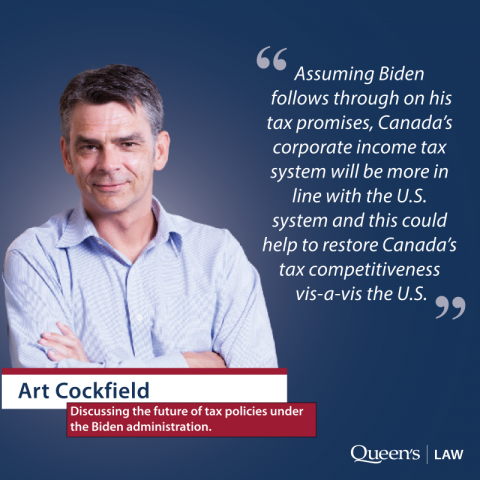
With the Biden inauguration dominating international news, six Queen’s Law experts are stating their predictions for how the new government will have an impact on Canada and across the globe. In today’s feature of the six-part series, Professor Art Cockfield examines tax reform.
Canada’s corporate competitiveness to be restored
Under the support of then-President Donald Trump, the United States engaged in significant corporate tax reform in 2017 through the Tax Cuts and Job Act (TCJA). For instance, federal corporate tax rates were reduced from 35 per cent to 21 per cent and the top individual tax rate was reduced from 39.6 per cent to 37 per cent.
The U.S. reforms made the U.S. corporate tax system relatively more attractive than the Canadian system. In fact, the reforms wiped out Canada’s “tax advantage” that had been touted by Canadian governments since the Chretien administration. Lower Canadian corporate income taxes – more technically, marginal effective tax rates – compared to U.S. taxes served to attract foreign direct investment to Canada, increasing employment and providing other benefits.
Canada’s prospects seem sunnier under the Biden presidency. Biden has promised to increase the U.S. federal corporate income tax rate to 28 per cent and reinstate the corporate alternative minimum tax that was repealed by the TCJA. Biden intends to restore the 39.6 per cent individual income tax rate for individuals with taxable income above USD$400,000. Biden also hopes to reduce the favorable tax treatment for long-term capital gains and qualified dividends above USD$1 million.
Assuming Biden follows through on his tax promises, Canada’s corporate income tax system will be more in line with the U.S. system and this could help to restore Canada’s tax competitiveness vis-a-vis the U.S. The proposed U.S. individual income tax reforms would also bring the United States closer to the system within Canada.
In short, Biden’s promised moderate tax increases on individuals and corporations would restore the U.S. to a tax position that is more aligned with the current Canadian approach. This outcome could also ensure that tax does not overly distort investment decision-making between the two countries.
Professor Arthur Cockfield specializes in tax law and has received several research fellowships and grants. For his current major project, “Invisible Underworld: Inhibiting Global Financial Crime,” he and collaborator Christian Leuprecht of Queen’s and RMC political studies received an Insight Grant from the Social Science and Humanities Research Council.